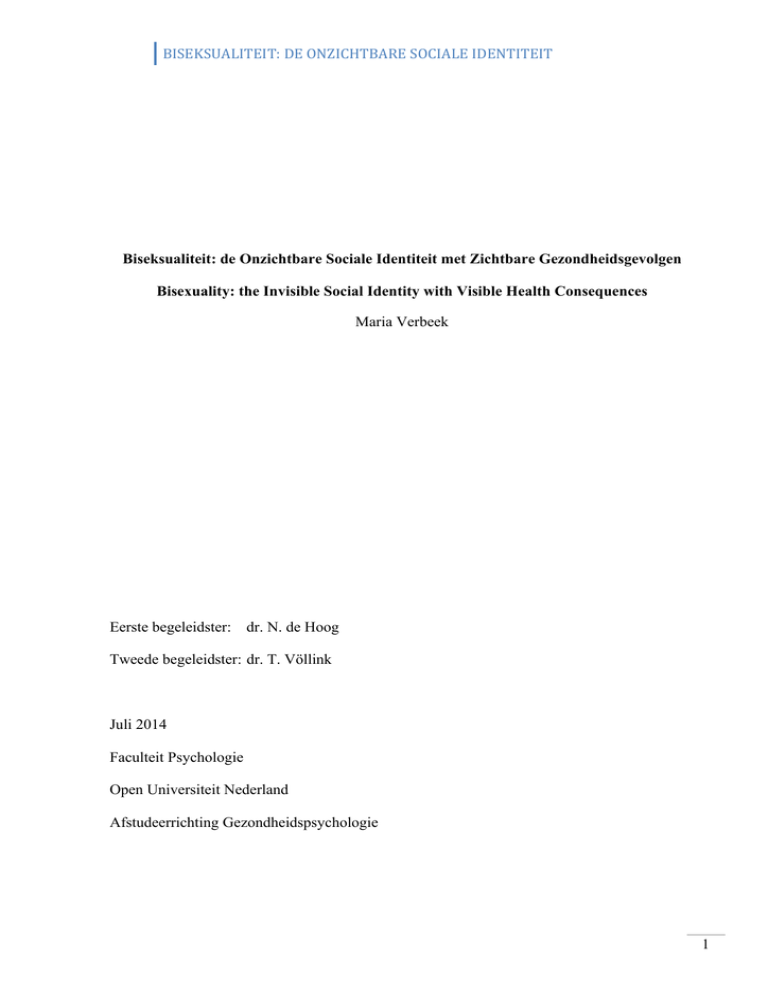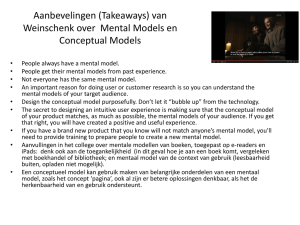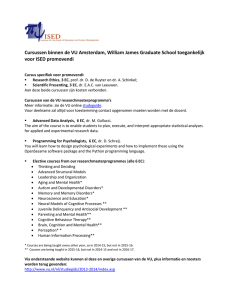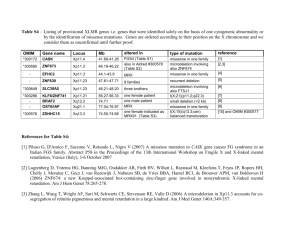BISEKSUALITEIT: DE ONZICHTBARE SOCIALE IDENTITEIT
advertisement

BISEKSUALITEIT: DE ONZICHTBARE SOCIALE IDENTITEIT Biseksualiteit: de Onzichtbare Sociale Identiteit met Zichtbare Gezondheidsgevolgen Bisexuality: the Invisible Social Identity with Visible Health Consequences Maria Verbeek Eerste begeleidster: dr. N. de Hoog Tweede begeleidster: dr. T. Völlink Juli 2014 Faculteit Psychologie Open Universiteit Nederland Afstudeerrichting Gezondheidspsychologie 1 BISEKSUALITEIT: DE ONZICHTBARE SOCIALE IDENTITEIT Inhoudsopgave 1. Samenvatting 3 2. Summary 5 3. Inleiding 7 4. Methode 19 5. Resultaten 25 6. Discussie 32 7. Literatuurverwijzingen 41 Appendix A Vragenlijst in Thesistools 45 Appendix B Vragenlijst Outness Inventory 53 Appendix C Vragenlijst Multidimensional Scale of Perceived Social Support 55 Appendix D Vragenlijst DASS21 56 Appendix E Vragenlijst SLEEP-50 58 Appendix F Informatieve tekst voor internetsites 60 2 BISEKSUALITEIT: DE ONZICHTBARE SOCIALE IDENTITEIT Biseksualiteit: de Onzichtbare Sociale Identiteit met Zichtbare Gezondheidsgevolgen Maria Verbeek Samenvatting Veel biseksuelen zijn niet ‘open’ over hun geaardheid. Zij zijn ‘onzichtbaar’ als biseksueel. Degenen die open zijn over hun seksuele geaardheid, nemen hiermee de sociale identiteit biseksueel aan. Het aannemen van een sociale identiteit kan, volgens de Sociale Identiteit Theory (SIT) van Tajfel (1978), leiden tot zelfwaardering en groepsverbondenheid. Zelfwaardering en groepsverbondenheid kunnen positieve gevolgen hebben voor de mentale gezondheid van het individu. De onzichtbaarheid van de biseksuele sociale identiteit kan leiden tot mentale gezondheidsproblemen als stress, depressie, slapeloosheid, suïcide en angst. Het doel van dit onderzoek is na te gaan of er een relatie is tussen de mate van openheid over de eigen biseksualiteit en mentale gezondheidsproblemen die biseksuelen kunnen ervaren op basis van deze sociale identiteit. Tevens wordt onderzocht of sekse, leeftijd en waargenomen sociale steun van invloed zijn op deze relatie. Als openheid een bepalende determinant is met betrekking tot de mentale gezondheid, dan kan dit van invloed zijn op de coming out van biseksuelen. Er hebben 197 biseksuelen, tussen de 18 en 73 jaar, deelgenomen aan dit onderzoek. 79 internetsites zijn aangeschreven met het verzoek een informatieve tekst te plaatsen met een link naar de online vragenlijst, de basis voor het onderzoek. De vragenlijst omvat items met betrekking tot openheid over biseksuele geaardheid, leeftijd, sekse, waargenomen sociale steun en mentale gezondheidsproblemen. Deze vragenlijst is eenmalig afgenomen. 3 BISEKSUALITEIT: DE ONZICHTBARE SOCIALE IDENTITEIT Bovenstaande items zijn gemeten met respectievelijk de Outness Inventory (OI) van Mohr en Fassinger (2000), de Multidimensional Scale of Perceived Social Support (MSPSS) (Zimet, Dahlem, Zimet, & Farley, 1988), de Depression Anxiety and Stress Scales (DASS21) van Lovibond en Lovibond (1995) en de SLEEP-50 (Spoormaker, Verbeek, van den Bout, & Klip, 2005). De vragenlijst is aangevuld met eigen vragen met betrekking tot suïciderisico. De resultaten laten zien dat de mate van openheid over de biseksuele geaardheid van invloed is op de gezondheid: onzichtbare biseksuelen ervaren meer mentale gezondheidsproblemen dan biseksuelen die zichtbaar zijn, open zijn over hun seksuele geaardheid. Het regressiemodel is significant en hiermee wordt de negatieve samenhang tussen openheid en mentale gezondheidsproblemen bevestigd. De resultaten laten tevens zien dat de veronderstelde modererende werking van sekse, leeftijd en waargenomen sociale steun niet significant is. Openheid over de biseksuele geaardheid kan van invloed zijn op de gezondheid. Als openheid van invloed is op de gezondheid, kan de coming out als biseksueel wellicht positieve gevolgen voor de gezondheid hebben. Er worden aanbevelingen gedaan voor vervolgonderzoek om meer inzicht te krijgen in de aard van de mentale gezondheidsproblemen en de invloed van waargenomen sociale steun. Keywords: biseksualiteit, sociale identiteit, depressie, stress, angst, suïciderisico, mentale gezondheidsproblemen, openheid, waargenomen sociale steun 4 BISEKSUALITEIT: DE ONZICHTBARE SOCIALE IDENTITEIT Bisexuality: the Invisible Social Identity with Visible Health Consequences Maria Verbeek Summary Many bisexuals are not ‘open’ about their sexual orientation. They are 'invisible' as bisexual. Those who are open about their sexual orientation, show their commitment to the social identity as bisexual, consider themselves as a member of this group. According to the Social Identity Theory (SIT) of Tajfel (1978), adopting a social identity may lead to selfesteem and group solidarity. Self-esteem and group solidarity can have positive effects on the mental health of the individual. The invisibility of the bisexual social identity can lead to mental health problems such as stress, depression, insomnia, anxiety and suicide. The aim of this study is to determine whether there is a relationship between the degree of openness about one’s own bisexuality and mental health problems bisexuals can experience based on this social identity. It is also examined whether gender, age and perceived social support affect this relationship. If openness is a key determinant related to health, it can affect the coming out of bisexuals. 197 bisexuals, aged between 18 and 73 years, participated in this study. 79 websites were contacted with the request to place an informative text containing a link to the online questionnaire, the basis for this research. The questionnaire includes items related to openness about bisexual orientation, age, gender, perceived social support and mental health. This survey was conducted once. Items listed above are measured respectively with the Outness Inventory (OI) Mohr and Fassinger (2000), the Multidimensional Scale of Perceived Social Support (MSPSS) (Zimet, Dahlem, Zimet, & Farley, 1988), the Depression Anxiety and Stress Scales (DASS21) by Lovibond and Lovibond (1995), and the SLEEP-50 (Spoormaker, Verbeek, van den Bout, 5 BISEKSUALITEIT: DE ONZICHTBARE SOCIALE IDENTITEIT & Cliff, 2005). The questionnaire was completed by self-formulated questions related to suicide risk. The results show that the degree of openness about bisexual orientation affects health: invisible bisexuals experience more mental health problems than bisexuals who are visible, are open about their sexual orientation. The regression model is significant and the negative correlation between openness and mental health is confirmed. The results also show that the supposed moderating effects of gender, age and perceived social support are not significant. Openness about bisexual orientation may affect mental health. If openness affects mental health, coming out as bisexual may possibly contribute to this. Recommendations are made for further research for a better understanding of the nature of mental health and the influence of perceived social support. Keywords: bisexuality; social identity; depression; stress; anxiety; risk of suicide; mental health; openness; perceived social support 6


